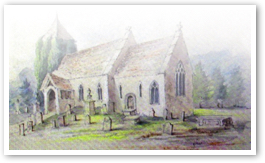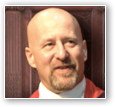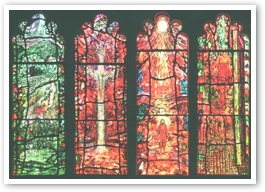A Mystical Metaphysical: An Introduction to Thomas Traherne
- FATHER DWIGHT LONGENECKER
My little sister followed me to England, fell in love with the country, fell in love with an Englishman, and fell in love with the English poets.
She studied English literature in the United States under the great Thomas Howard and continued her graduate work on the obscure seventeenth-century poet Thomas Traherne. Before her too-early death last spring she published three books on Traherne under her married name, Denise Inge, and established herself as a leading Traherne scholar.
It is through her love of Traherne that I have recently become re-acquainted with the unusual story of the tender-hearted poet priest who writes with an innocent and mystical clarity that echoes Herbert and Vaughan and points forward to Wordsworth, Blake and Hopkins. Added to the beauty of Traherne's writing is the humility and simplicity of his life. A simple country parson and chaplain to a nobleman, Traherne was never known in his lifetime, and his work was discovered in dusty family archives, rescued from smoldering trash heaps, uncovered in archbishop's libraries and winkled out by curious bibliophiles from second-hand books stalls just before burning.
Putting together the few known details of Traherne's life has been the work of scholars and antiquarian detectives. It is guessed that he was born the son of a Hereford shoemaker in 1636 while others suppose he was the son of an innkeeper named Traherne. We know he was educated at the cathedral school in the city and went on to Brasenose College, Oxford. He was eventually ordained and became the rector of St Mary's, Credenhill in Herefordshire where he remained for ten years. He went from there to be the private chaplain to Sir Orlando Bridgeman, and died of smallpox at his home in Teddington.
Traherne wrote theological treatises, poetry and philosophical works, only one of which — an anti Catholic polemic — was published during his lifetime. At his death in 1674 his brother inherited his writings and they were passed down in the family for over two hundred years. Then in the late 1800s a browsing bibliophile named William Brooke discovered some anonymous manuscripts in a wheelbarrow outside a London bookstall that he identified as lost works of the poet Henry Vaughan. Various other experts agreed and it was not until another literary sleuth determined that the writings were by the obscure Traherne. These varied thoughts were gathered together and published as Traherne's most famous book A Century of Meditations — a book C.S.Lewis called "almost the most beautiful book written in English."
Since then more Traherne manuscripts have been discovered at Lambeth Palace, on a burning rubbish heap in Lancashire and in the Folger Library in Washington D.C.
 Credenhill Church
Credenhill ChurchLiving in one of the most beautiful corners of rural England, Traherne wrote Centuries of Meditations while he was Rector of Credenhill. His work glories in the revelation of God within his creation. Traherne sees within the natural world the glory of God burning in every mystical moment. Traherne's vision is shared by Hopkins who cries out that "the world is charged with the glory of God" or Blake who sees "the world in a grain of sand, and… eternity in the palm of your hand."
Like Wordsworth and Blake, Traherne's theme is the lost innocence of Eden, and his praise is for the child who is the father of the man. He steers clear of any obsession with sin, darkness and despair and instead writes with clear-eyed optimism, joyful affirmation and a tender-hearted love of all things. In Centuries he asks positively, "Can a man be just unless he love all things according to their worth?" His work is overflowing with a joyful immanence. God's joy presses in on us here and now in this world, and he wants us to be happy, child like, free and abundantly alive. So he writes, "Your enjoyment of the world is never right, till every morning you awake in Heaven: see yourself in your Father's palace; and look upon the skies, the earth, and the air as celestial joys: having such a reverend esteem of all, as if you were among the angels."
In his philosophical musings Traherne deals with the question of desire, turning away from negative notions that desire brings unhappiness and claiming instead that human desire good at heart and is always a longing for what is beautiful, good and true. In a memorable line he says we must "want like a god that you may be satisfied by God." Rather than being that which drags us down, desire is that which lifts us up, and it is that desire reaching and knowing the beauty of the created order that brings us to a genuine experience of God in and through, and knowable in his creation.
Like all the great Christian poets, Traherne brings us to a new understanding of ourselves and our place in the created order. We see afresh and know something new. After reading his work one is both humbled and exalted. The beauty, simplicity and wisdom of his words echo in the mind and heart bringing one both down to earth and up to heaven at the same time.
My own scholarly sister's work Happiness and Holiness has been hailed as the best introduction to the life and work of Thomas Traherne. In a world beset by violence, doubt, despair, cynicism and sin to turn to Traherne is to breathe a gust of fresh Spring air. His work is a tall window opened wide, celestial music and earthly birdsong. His words are a blissful tonic, a droplet of hope, a solid joy and a lasting treasure.
 This is Meaghen Gonzalez, Editor of CERC. I hope you appreciated this piece. We curate these articles especially for believers like you.
This is Meaghen Gonzalez, Editor of CERC. I hope you appreciated this piece. We curate these articles especially for believers like you.
Please show your appreciation by making a $3 donation. CERC is entirely reader supported.

Acknowledgement
 Father Dwight Longenecker. "A Mystical Metaphysical: An Introduction to Thomas Traherne." The Imaginative Conservative (October 5, 2014).
Father Dwight Longenecker. "A Mystical Metaphysical: An Introduction to Thomas Traherne." The Imaginative Conservative (October 5, 2014).
Reprinted with permission from The Imaginative Conservative. See the original article here.
Standing on my head is the blog of Father Longenecker on Patheos.
The Author
 Father Dwight Longenecker serves as the pastor of Our Lady of the Rosary parish in Greenville, South Carolina. Father Longenecker studied for the Anglican ministry at Wycliffe Hall, Oxford and served for ten years in the Anglican ministry as a curate, a chaplain at Cambridge and a country parson. In 1995 he and his family were received into full communion with the Catholic Church. He is the author of more than twenty books including: Beheading Hydra, Praying the Rosary for Inner Healing, Listen My Son: St. Benedict for Fathers, More Christianity, Challenging Catholics: A Catholic Evangelical Dialogue, St. Benedict and St. Therese: The Little Rule & the Little Way, Mary: A Catholic-Evangelical Debate, and The Path to Rome. You can follow his writings, listen to his podcasts, join his online courses, browse his books, and be in touch at DwightLongenecker.com.
Father Dwight Longenecker serves as the pastor of Our Lady of the Rosary parish in Greenville, South Carolina. Father Longenecker studied for the Anglican ministry at Wycliffe Hall, Oxford and served for ten years in the Anglican ministry as a curate, a chaplain at Cambridge and a country parson. In 1995 he and his family were received into full communion with the Catholic Church. He is the author of more than twenty books including: Beheading Hydra, Praying the Rosary for Inner Healing, Listen My Son: St. Benedict for Fathers, More Christianity, Challenging Catholics: A Catholic Evangelical Dialogue, St. Benedict and St. Therese: The Little Rule & the Little Way, Mary: A Catholic-Evangelical Debate, and The Path to Rome. You can follow his writings, listen to his podcasts, join his online courses, browse his books, and be in touch at DwightLongenecker.com.





